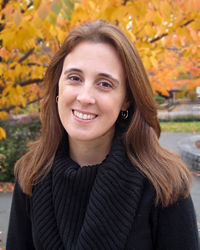User:Ssutton: Difference between revisions
No edit summary |
No edit summary |
||
| (32 intermediate revisions by 2 users not shown) | |||
| Line 1: | Line 1: | ||
[[Image: | [[Image:Samantha2.jpg|200px|center]] | ||
'''Samantha Sutton''' | |||
'' | samantha ''at'' handelgroup ''dot'' com | ||
[http://frameshiftcoaching.wordpress.com '''My Blog'''] | |||
[http://frameshiftcoaching.wordpress.com '''Life Coaching and Personal Development in Boston'''] | |||
'''Where am I now?''' | |||
After 6 years in the trenches at MIT, I decided that I want to further science by helping scientists and engineers live more fulfilling, happy lives. I am now working as a [http://www.handelgroup.com life coach in Boston and New York City with the Handel Group]. The Handel Group currently teaches a class at MIT called [http://ocw.mit.edu/OcwWeb/Athletics--Physical-Education-and-Recreation/PE-550January--IAP--2007/CourseHome/index.htm Designing Your Life] that kicks off every IAP and continues through the year. | |||
'''Education''' | |||
*Ph.D. in Biological Engineering (2008), [http://web.mit.edu Massachusetts Institute of Technology] | |||
*B.S. in Electrical Engineering with minors in French Studies and Bioengineering (2001), [http://www.uiuc.edu University of Illinois at Urbana-Champaign] | |||
'''How does my Ph.D. work fit into the field of Synthetic Biology?''' | |||
Synthetic Biology is centered on the goal of engineering cells to perform functions of use to humans. Just as an electrical engineer engineers with silicon and copper to build electrical circuits, a synthetic biologist engineers with protein and DNA to build intracellular circuits. My particular focus is the design of synthetic protein-protein interaction networks within cells. For my Ph.D. work, I defined a new type of intracellular device, called Post-Translational Device, or PTD. To that end, I have developed modular protein components that can be added to proteins and cause them to interact in a phospho-mediated manner. | |||
I will post my Thesis presentation here... stay tuned! | |||
'''The constructs and strains I've built''' | |||
If you're interested in any of the constructs or strains I've built during my graduate work, email myself or Drew Endy (endy at stanford dot edu). Here's a spreadsheet of all of my constructs and strains: | |||
[ | [[image:Sutton_Phospholocator_fzr.xls]] | ||
Latest revision as of 12:10, 30 October 2009

Samantha Sutton
samantha at handelgroup dot com
Life Coaching and Personal Development in Boston
Where am I now?
After 6 years in the trenches at MIT, I decided that I want to further science by helping scientists and engineers live more fulfilling, happy lives. I am now working as a life coach in Boston and New York City with the Handel Group. The Handel Group currently teaches a class at MIT called Designing Your Life that kicks off every IAP and continues through the year.
Education
- Ph.D. in Biological Engineering (2008), Massachusetts Institute of Technology
- B.S. in Electrical Engineering with minors in French Studies and Bioengineering (2001), University of Illinois at Urbana-Champaign
How does my Ph.D. work fit into the field of Synthetic Biology?
Synthetic Biology is centered on the goal of engineering cells to perform functions of use to humans. Just as an electrical engineer engineers with silicon and copper to build electrical circuits, a synthetic biologist engineers with protein and DNA to build intracellular circuits. My particular focus is the design of synthetic protein-protein interaction networks within cells. For my Ph.D. work, I defined a new type of intracellular device, called Post-Translational Device, or PTD. To that end, I have developed modular protein components that can be added to proteins and cause them to interact in a phospho-mediated manner.
I will post my Thesis presentation here... stay tuned!
The constructs and strains I've built
If you're interested in any of the constructs or strains I've built during my graduate work, email myself or Drew Endy (endy at stanford dot edu). Here's a spreadsheet of all of my constructs and strains: